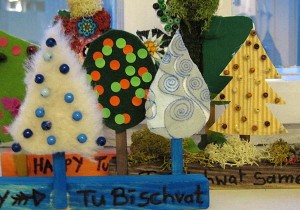The significance of holidays isn’t just getting a few days off of work and school.´This holds true as much in Israel as elsewhere. Tu bi-Shevat, the “New Year’s Festival of the Trees,” which falls this year on 26 January, fails to meet the admittedly not always religious criterion of holiday.

From our Tu bi-Shevat workshop for children, 2012 © Jewish Museum Berlin, photo: Nadja Rentzsch
But Israeli children at least have to spend the day in nature, because the custom on Tu bi-Shevat is to make an excursion into the country to plant trees. Most look forward to it; for some, however – and I as a child was included in this latter group – it’s a relief when the cultivation of trees is replaced by some other form of togetherness in the shelter of the classroom.
In fact, in the last fifteen years the tradition of planting that had already been nurtured by the Zionist movement has been increasingly augmented by a new tradition, that of the Tu bi-Shevat seder, whose name alludes to the seder (Hebrew: order) at the beginning of Passover. → continue reading
Candy is a tricky matter for synagogues on Simhat Torah, the holiday celebrating the Torah and its yearly reading cycle. On this evening, the Torah scrolls are carried around the synagogue in festive processions and worshippers sing, dance, and throw sweets for children to collect.  In small synagogues, this procedure is fairly straightforward.
In small synagogues, this procedure is fairly straightforward.
But large synagogues can have issues with Milka-bars and Twixes flying through the air. To be fair, not many adults enjoy a barrage of caramels raining down on their heads, no matter the brand, no matter the degree of religious devotion. And to be very fair, bonbons thrown from synagogue balconies can be hazardous for the Torah scrolls, too. → continue reading
Maybe I should have fasted, but instead, I was rubbing my injured knee and wrist, picking up my bicycle from the road where I’d fallen.
 On Yom Kippur, the Day of Atonement, one is supposed to reflect on one’s sins over the last year, to apologize to friends and family, to pray and to fast. And as it is the holiest of all Jewish holidays, it is widely respected in Israel, even by atheists. Trains, buses, and airplanes all stop running; shops and restaurants remain closed; even driving a car is taboo. And so, with the streets and highways empty and nothing on the radio or TV, it has become the perfect occasion for those of us who don’t take atonement all that seriously to go out for a bike ride. → continue reading
On Yom Kippur, the Day of Atonement, one is supposed to reflect on one’s sins over the last year, to apologize to friends and family, to pray and to fast. And as it is the holiest of all Jewish holidays, it is widely respected in Israel, even by atheists. Trains, buses, and airplanes all stop running; shops and restaurants remain closed; even driving a car is taboo. And so, with the streets and highways empty and nothing on the radio or TV, it has become the perfect occasion for those of us who don’t take atonement all that seriously to go out for a bike ride. → continue reading


